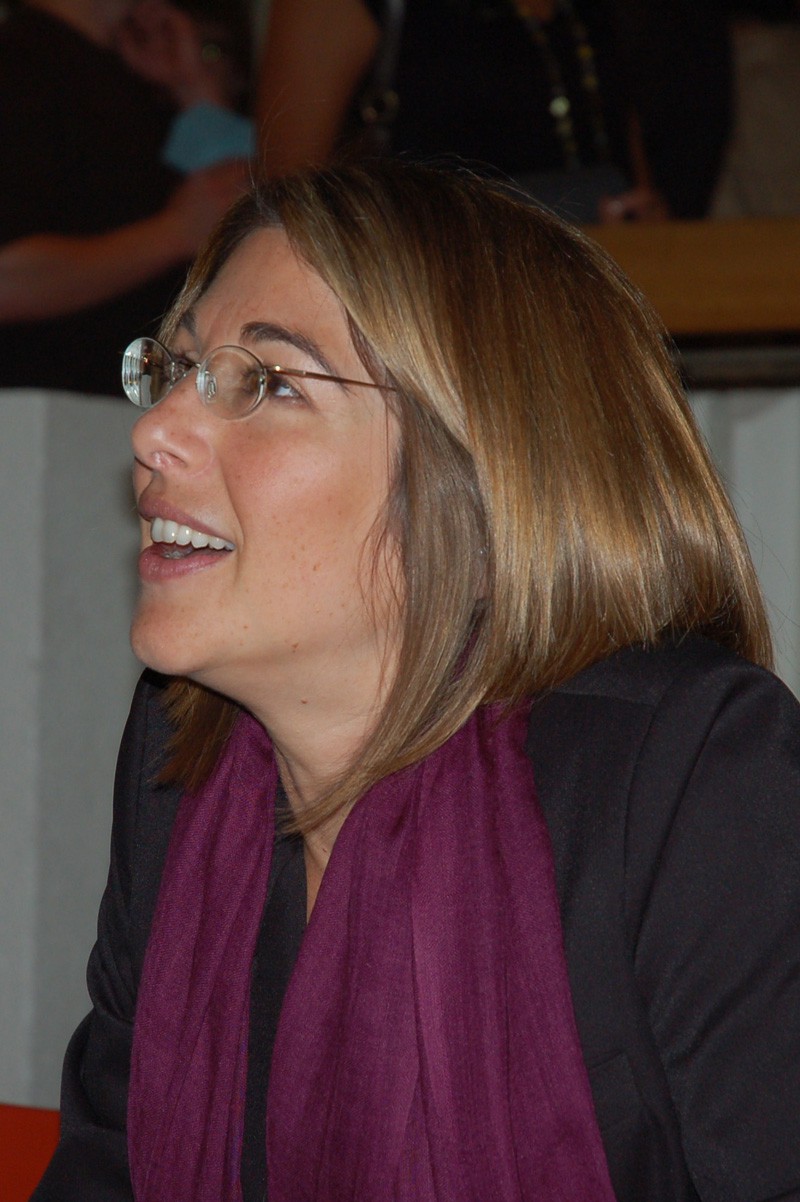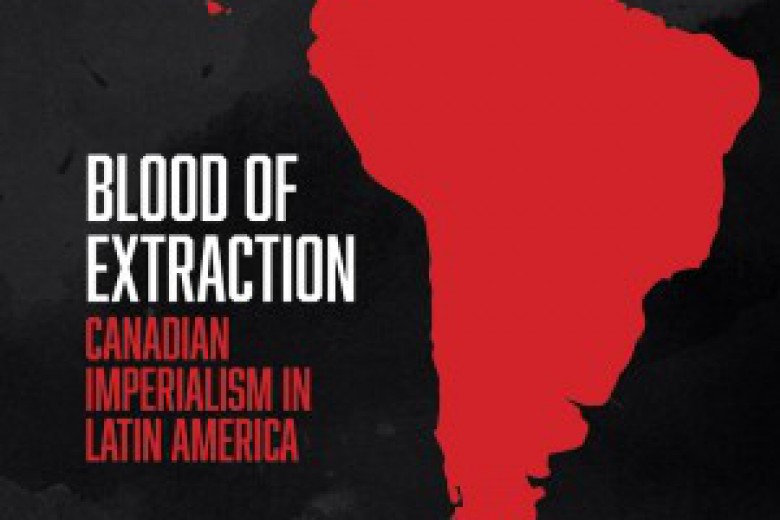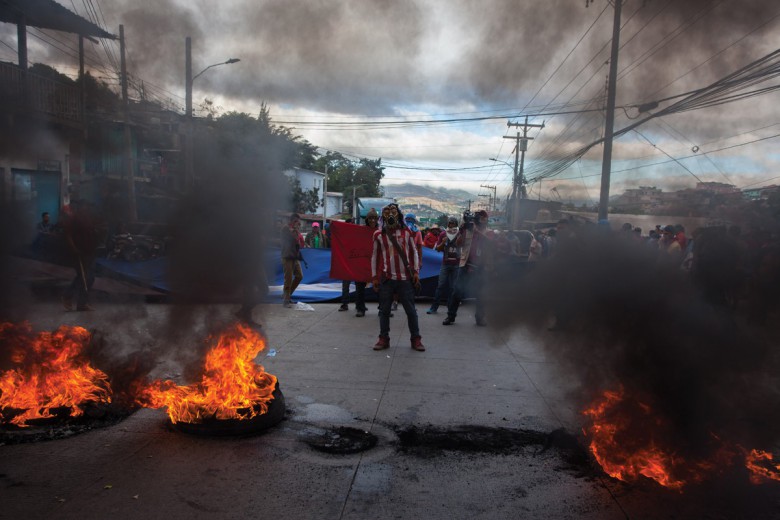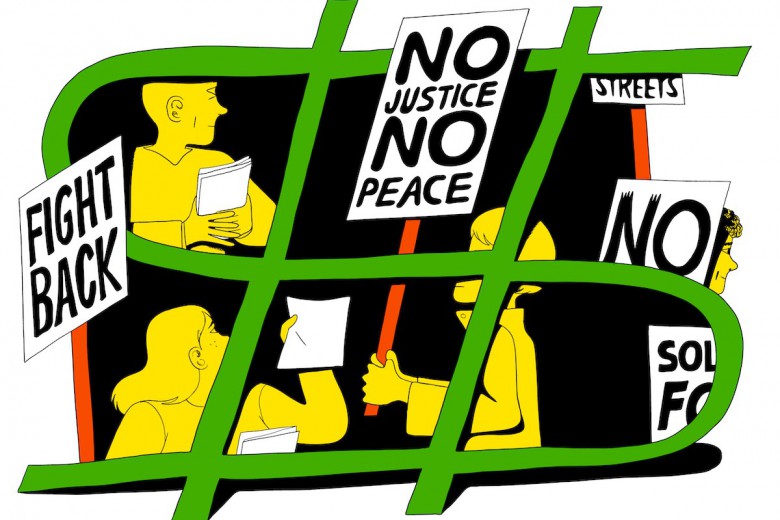
Naomi Klein is an award-winning journalist, syndicated columnist and the author of two international bestsellers, No Logo: Taking Aim at the Brand Bullies (2000) and The Shock Doctrine: The Rise of Disaster Capitalism (2007).
Klein is a firm believer in the notion that, if you can get a powerful idea into the hands of those with the capacity and motivation to act on it, you can change the world. Indeed, in The Shock Doctrine, she documents how the radical free market ideas of Milton Friedman have changed the world – not through their persuasive power or popular appeal, but through the creative exploitation by Friedman’s disciples of whatever shock might happen to present itself, be it a coup, a tsunami, a stock market crash, or a massive military bombardment.
The Shock Doctrine details how time and again, governments of all stripes have used almost any crisis that presents itself as an opportunity to advance radical economic restructuring: gutting social programs, privatizing and deregulating large sectors of economies, and leaving a global trail of devastation in their wake. Committed to nothing less than the exposure of the dominant economic theory of our time as a blood-soaked fraud, Klein shows that unfettered capitalism is an inherently violent ideology that is fundamentally incompatible with political freedom and true democracy.
By providing a counter-narrative that can help people to make sense of these trends, Klein seeks to make us less susceptible to shock and better prepared to defend and rebuild the public sphere in its wake.
Briarpatch editor Dave Oswald Mitchell spoke with Naomi Klein in Regina in September, following her address to a capacity crowd of 800 people.
Briarpatch: You came to prominence as a leading theorist of the antiglobalization movement. Can you talk about what happened to that movement after 9/11?
Naomi Klein: You know, it never really was a “˜movement.’ I always called it a “˜movement of movements.’ Or even more, a “˜moment’ – a moment of convergence, a moment when a lot of different movements saw themselves in one another’s struggles, and, together, built large coalitions in opposition to these really ambitious trade policies. Those policies really built our coalitions for us because they affected so many different sectors and reached into so many different countries simultaneously.
We were as global as the forces we were up against. Those forces are now in crisis – the World Trade Organization negotiations are stalled and the Free Trade Area of the Americas is dead – so I think it makes a certain amount of sense that popular movements are re-regionalizing, too.
So it really depends on where we’re talking about. The movement against neo-liberalism is certainly alive and well in Latin America. I mean, think about how far to the left Latin America has moved since 9/11. At the Summit of the Americas in Quebec City in 2001, all 34 heads of state signed on the dotted line.
And it’s not just about who is in office; it’s that those people have company. They’re building trading blocs and developing an alternative economic model. And that model itself is being challenged from the left by grassroots indigenous movements that say developmentalism is too heavily based on extraction and fossil fuels, that the whole mentality of extraction and developmentalism also needs to be challenged. That’s what President Rafael Correa is facing in Ecuador right now. So things have moved radically forward in Latin America.
What about in Canada?
Here in Canada, what happened after 9/11 was really dramatic. We had just had this big protest at the Summit of the Americas in Quebec City in April 2001. And I remember really clearly what happened: the big NGOs, many of which rely on foundations to get their funding, got spooked, and the trade unions suddenly didn’t want to have anything to do with confrontational street demonstrations. There was a full-on media onslaught trying to equate “those scary anarchists” in Quebec City with terrorists. As a result, people went back to their corners. There was a retreat into single-issue politics. It wasn’t that people stopped believing what they believed, it’s that the willingness to work together and build these innovative coalitions was lost.
The other thing that happened, though, was that an anti-war movement quickly emerged out of the infrastructure of the so-called antiglobalization movement. The network of Indymedia sites was really the backbone of those massive, global anti-war demonstrations before the Iraq war.
And meanwhile, people who were more inclined to street activism were just focusing on stopping the war. We were in a state of emergency. But, also, there was a sense in some of the anti-war groups that you had to have a really simple message like “Stop the war” that everyone could agree on – that you couldn’t really talk about the economics of war because not everyone agreed on that. So there was a kind of dumbing down of the analysis we had of the way the world actually worked from what we saw in the streets in Seattle, Quebec City, Genoa.
The epigraph of The Shock Doctrine reads, “Any change is a change in the topic.” Was that part of what happened to the antiglobalization movement – that the topic was changed on us?
Well, “any change is a change in the topic” cuts both ways. I mean, we changed the topic in 1999. They wanted to talk about globalization, which was treated as an inevitable force of nature. But in Seattle, we changed the topic to capitalism, deregulation, and their impact on workers, the environment and human rights.
But then in 2001, the topic was changed on us – from economics to security. Two weeks after 9/11, the National Post ran a story under the headline, “Anti-globalization is so yesterday.” They could not wait to change the subject. I personally think we were on to something, and the fact that we were debating global capitalism in the streets as opposed to, say, arguing about one political party or another was actually a very threatening moment for capitalism. And so we saw that rush to change the subject.
That quote comes from Argentinian novelist César Aira. But I first heard it in a conversation with Claudia Acuña, an Argentinian investigative journalist. I quote her in The Shock Doctrine talking about how, in Argentina, the violence was so extreme that it was impossible to see the economic project behind the violence. That was the most important thing I learned in Argentina: the blinding effects of violence. When Claudia said that to me, she also quoted César Aira: “Any change is a change in the topic.” Cualquier cambio es un cambio de tema.
“Everyone is talking about terrorism,” she said. “You have to talk about something else.” Hence that epigraph, because that’s what I’m trying to do with the book – I’m trying to change the topic back.
You’ve recently begun using the term disaster populism in your lectures. Can you talk about what you mean by that?
I guess I’m trying to invoke the 1930s and ’40s and the context of an economic shock that put the free-market ideology on trial.
As I write in The Shock Doctrine, Milton Friedman very clearly understood his movement as a crusade to undo the New Deal. The right realized that when the 1929 market crash happened, the left was ready. The populists were ready with their ideas. And the right at that time, the corporate forces, didn’t take ideas seriously, didn’t think ideas mattered, because they had all the money and power.
Lewis H. Lapham has written really well about this, about how Corporate America suddenly realized in the 1960s that they needed to get into the ideas business. Lapham talks about just how uninterested the elites had been in ideas and intellectual life, and the systematic funding of the think tanks that followed this realization. You saw this wave of new think tanks being launched between 1970 and 1977.
So this is part of progressive history, that actually, progressives organically respond to crisis with the ideas that were lying around. And now we’re up against this crisis-response machine, this army of think tanks. Their whole purpose is to keep the ideas of neo-liberalism ready until, in Friedman’s words, “the politically impossible becomes politically inevitable.” That’s why they get the big bucks.
The other phrase I use is disaster collectivism, which is a phrase I got from Saket Soni, an organizer in New Orleans who works with immigrant workers. I actually launched the book in New Orleans, and we had this exchange between New Orleans community organizers and Indian community organizers from the tsunami-affected region. And at that meeting, Saket stood up and said, “Look, they have disaster capitalism; we need disaster collectivism.”
But the real reason to talk about disaster populism or disaster collectivism – I actually like both terms – is to be as clear as possible that I’m not saying you shouldn’t respond to disasters, or that responding to disasters is inherently anti-democratic. The question is, how? You can respond in a highly democratic way, or you can respond in an authoritarian way.
This is the way Latin Americans understand what happened there in the 1970s. You know, The Shock Doctrine is not an original analysis in Latin America. What’s original about the book is applying a Latin American analysis to other places than Latin America. What inspired the book was actually being in Argentina, a country that had just experienced a profound shock in the form of an economic crisis.
Because they knew their history, they did not give in to their fear. When we arrived in Argentina, everyone was saying, “There’s going to be another coup, there’s going to be another coup,” but they repelled it through street protests. When the government declared a state of siege, people took to the streets. And then we witnessed this incredible thing, which was, effectively, disaster collectivism: meetings on every street corner, barter centres, and workers turning shut-down factories into democratic co-operatives, which was the subject of our film The Take – just spontaneous organizing everywhere to meet this disaster.
So, for me, it’s not just a theory. I really feel like I got to live it, I got to see it. And I think we need to know that history a lot better in our own countries. I don’t know it well enough in Canada.
What would it take for progressives in North America to actually seize back the initiative and start setting the agenda, the way we’re seeing in Latin America?
You know, we don’t have a bloody-minded enough impulse on the left sometimes. It’s like Yeats said: “The best lack all conviction, while the worst are full of passionate intensity.” We miss opportunities, for example, to point out the profound intellectual crisis on the right. I mean, the National Post just published an op-ed by Conrad Black about the credit crisis. How absurd is it that the National Post goes to him for advice on how to deal with the crisis on Wall Street? I mean, how crazy is that?
You know, when Conrad Black was convicted, I felt that the left didn’t do nearly enough gloating. I know it sounds silly, but I mean, this is the man who has hammered away in this country about how much more we should be like the United States. And there he was on trial in the United States, but they couldn’t even find a jury that hadn’t already convicted him in their minds, because they just had this inherent suspicion of rich CEOs. He found himself a casualty in a class war that he himself had been pivotal in starting!
Likewise, Hurricane Katrina should have been an opening to talk about the intersection between climate change and neglected infrastructure. It’s always amazing to me that when these hurricanes hit, people barely talk about climate change. I think that the left and the environmental movement feel that it’s somehow unseemly, you know?
The right does not have that problem. They are actually using these hurricanes to push for more oil drilling!
But it goes beyond that. I actually think we have a moral responsibility to respond to these crises by making our arguments more forcefully. There’s a deep crisis of confidence on the left that’s evident in these moments, which are tests. My friend Jeremy Scahill calls it being a vegetarian between meals – which just isn’t good enough. It actually matters what you do in a crisis much more than what you say after the dust has settled. When Wall Street is crashing, when cities are being flooded, that’s precisely when it is so important to push for progressive responses. We have to get to the root of that crisis of confidence.
The global food crisis strikes me as particularly fertile ground for these sorts of interventions.
There are definitely openings there. The food crisis has pushed a lot of countries that have become completely reliant on food imports to turn to the idea of food sovereignty simply as a survival mechanism. I was on a panel recently with Ellen Johnson-Sirleaf, the president of Liberia. She comes out of the World Bank, and is definitely within the neo-liberal model, but her government sees the food crisis as a wake-up call for Liberia. Liberia has become totally dependent on food imports, and she proposed a two-stage process to address that. First, they need aid to get through the emergency, and then they need to shift towards growing their own food. They want to get back to traditional crops and reduce their vulnerability to these price shocks.
In response to the financial meltdown on Wall Street, you recently wrote, “What is really being called into question by the crisis is the unquestioned commitment to growth at all costs. Where this crisis should lead us is to a radically different way for our societies to measure health and progress.” Within a capitalist economy, which is inherently growth-based, is such a shift even possible? And if not, then what?
You know, this is really the debate that’s happening now in Latin America, where you have governments that are talking a really good game about rejecting neo-liberalism, but are fundamentally locked within the capitalist system and fueling their economies through extractive industries. Sure, they’re investing in co-ops, and they have great anti-poverty programs and some agrarian reform, but the money that is financing it is oil and gas and open-pit mining.
The debate that’s going on in Ecuador right now, for instance, is over open-pit mining and extracting oil from the Yasuni National Park. The indigenous federation CONAIE has adopted the slogan, “leave it in the ground,” which is a direct challenge to the developmentalist policies of President Rafael Correa to extract it and redistribute it.
So I really don’t know the answer to the question. All I know is, it’s the right question. The debate that’s going on right now in Ecuador is at the cutting edge of the debate that we all need to have.
The solution that Ecuadoreans are proposing is a concept called “ecological debt,” which is to say that Ecuador should be paid by the countries that created the climate crisis to leave the oil and gas in the ground, so they are not kept in a state of arrested development because they are not extracting more fossil fuels from one of the most biologically diverse places in the world, the Yasuni National Park. We should pay them not to destroy that place. And the oil companies should help finance that.
I actually think that when you have the Bush administration nationalizing things right, left, and centre, there is an opportunity to say, well, if the U.S. government is going to start nationalizing things, why not nationalize Exxon? Why not nationalize health insurance?
Yeah, why not nationalize something that’s actually profitable.
The problem, though, is if the U.S. government had Exxon, it really wouldn’t make any difference. Instead, I think that on the agenda in Copenhagen at the next major climate summit, there should be a discussion of a mechanism for creating a global trust, through the UN, for fossil fuel revenues. I don’t think national governments should administer it. I think that emerging from a post-Kyoto process, there has to be a way of dealing with these obscene profits that the oil companies are posting year after year.
I mean, Exxon had 40 billion dollars in profits last year. That money should be paying for the transition to a green economy, and it should also be paying Ecuador to leave its oil in the ground. The money is there.
I feel a tremendous sense of urgency about this, because there’s a window of easy oil money. And we’re in it and we’re wasting it. It’s just going straight to shareholders, when they should be treated like criminals. They have left us with a massive disaster to clean up.
Last question: As we’re recording this, there are two big elections just around the corner. Who do you think is scarier – John McCain or Stephen Harper?
Stephen Harper.
Why?
He’s got more to undo. There’s barely anything left to privatize in the U.S., right? Stephen Harper can have health care.
And he’s smarter.



_780_520_90_s_c1.jpg)


